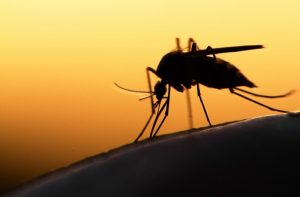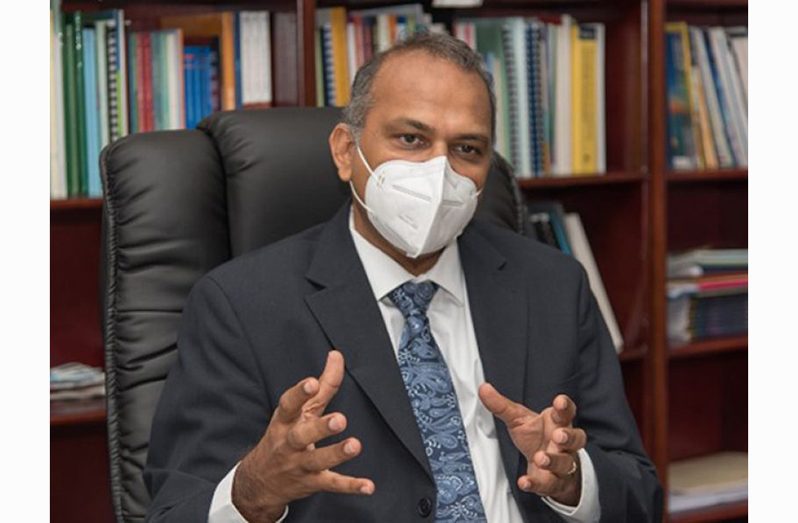…as global temperatures continue to rise
By Rehana Ahamad
AS we reported on Sunday, the notable rise in global temperatures will have a series of adverse effects on several sectors in Guyana, including food production and threatened sea defence due to the projected rise in sea level. Also, of major concern are the threats that increased temperatures would have on the nation’s health. The United Nations Inter-governmental Panel on Climate Change (IPCC) predicts that “global warming will worsen human health conditions, especially in tropical regions.” In countries such as Guyana, an increase in temperature indicates an increase in mosquito populations, thereby escalating the risk of a variety of insect-borne infections.
“…and those mosquitos would bring with them, a number of different types of diseases such as dengue and malaria, and chikungunya, and so forth,” Minister of Health, Dr. Frank Anthony, said in an invited comment.

He acknowledged the threats that global warming could have on a country such as Guyana. “In addition to vector-borne diseases, which are traditionally found in the tropics, you would also see an increase in flooding, and because of flooding, you can also contract other water-borne types of diseases,” the Health Minister highlighted.
Reflecting on the many environmental tragedies that occurred in 2020, Guyanese Scientist, Dr. Michelle Kalamandeen had told the Guyana Chronicle that climate change has inevitably created the deadly monster that is the novel coronavirus. In a previous interview with this newspaper, the biologist expressed confidence that the emergence of the COVID-19 is a consequence of global administrations ignoring, and, by extension, failing to address the critical connection between the environment and human health. She explained that three out of every four new infectious diseases in people come from animals. “More specifically, from our wildlife and from the livestock we keep in ever-increasing numbers…if an area becomes too hot or too cold for certain wildlife, they will migrate to new places, where they interact with other animals that they have never encountered before,” Dr. Kalamandeen had explained.
She reasoned that this usually results in humans increasingly sharing the same spaces and vying for the same food as various species of organisms, thereby increasing the risk of transmission of diseases from animals to humans.

Dr. Kalamandeen had explained that even though climate change continues at its own pace, the changes effected by humans are making matters far worse. “Carbon dioxide emitted from our everyday consumption of fossil fuel is shifting climate zones,” she posited.
She is adamant that the current COVID-19 pandemic is yet another warning shot of the consequences of ignoring the critical connections between the environment and human health. It would appear that these warning shots have not evaded the attention of Minister Anthony. He explained that the Health Ministry has embarked on a series of initiatives geared at tackling these climate-related threats head-on. “In Guyana, we have started to look at the effects of climate change in a very holistic way,” Dr. Anthony affirmed. He said that the government’s project to convert a number of health facilities into ‘Smart Hospitals” is also part of the comprehensive plan to address the effects of climate change.
The conversion of these facilities is being executed in collaboration with the United Kingdom and Pan-American Health Organisation (PAHO).
“…and through that initiative, we have been able to survey our health facilities across Guyana and to look at how we can make them more climate resilient; meaning, to prevent them from being flooded, to make sure that the services that they offer is more efficient, and to utilise things, such as rain water, for the purposes of the hospital,” Dr. Anthony related.
He said that those were just some of the Health Ministry’s efforts related to reducing our carbon footprint.
“…and also to move to renewable energy; so we have a plan for these facilities of how we are going to change over to these things…we have initiated the process with five facilities,” Dr. Anthony added.
These pilot hospitals include the Diamond Diagnostic Centre, the Leonora Regional Hospital, the Mabaruma Hospital, the Lethem Regional Hospital and the public hospital in Paramakatoi. Works have already commenced at the facilities in Diamond and Leonora.
“Once this works well, we are going to adopt it for the rest of the system,” the minister posited.
In the meantime, he said that the ministry will be continuing and even heightening its surveillance efforts for various diseases that are likely to be found in Guyana. “Also, we are setting up our new 10-year plan for the Ministry,” Dr. Anthony indicated.
He explained that this comprehensive strategic plan will examine a plethora of ways that the ministry can respond to climate change.
“…and our preparedness in terms of health response to things like pandemics and flooding and so forth…we want to ensure that we build that capacity to respond to effects of climate change, and try to make our systems more climate resilient,” Dr Anthony asserted.
HEAT WAVES AND THE VULNERABLE
In addition to vector and water-borne diseases, global warming also paves the way for increased heat waves, which would result in prolonged periods of abnormally high temperatures that can have serious health effects on vulnerable populations, such as the elderly and the sick.
“This was already seen during the 2003 heat wave in Europe, which claimed approximately 35,000 lives,” a recent UN Climate Change report indicated.
The United Nations Inter-governmental Panel on Climate Change further predicts that global warming will lead to hot days, followed by nights of high temperatures, which can result in persons developing potentially fatal hyperthermia or heatstroke. This is a concern shared by Chief Hydromet Officer, Dr. Garvin Cummings, who has been paying keen attention to the rise in temperatures, globally.
“There has been a trend of increasing temperatures globally, and this has serious effects on the world’s eco-system; 2020 happens to be one of the warmest years on earth, so this has a series of major implications,” Dr. Cummings said.
Global warming also poses a significant threat to persons with asthma and other respiratory diseases.
Additionally, “People suffering from heart problems are more vulnerable to increased temperatures, especially those living in already warm areas, as their cardiovascular system must work harder to keep their body cool,” the IPCC report indicated.
It explained that, “Hot temperatures increase the ozone concentration, which can damage people’s lung tissue and cause complications for asthma patients and those with lung diseases.”
“Increased global warming can also pose a threat to national security, affecting food security, which, in turn, can lead to resource conflicts,” the report noted.
Dr. Cummings had also underscored the food production and sea defence threats that are likely to affect Guyana, in light of global warming. Nonetheless, it is safe to say that the Ministries of Health, Agriculture and Public Works are all working to implement climate-smart technologies that address the impending crisis that Guyana could face as global temperatures continue to rise.



.jpg)








